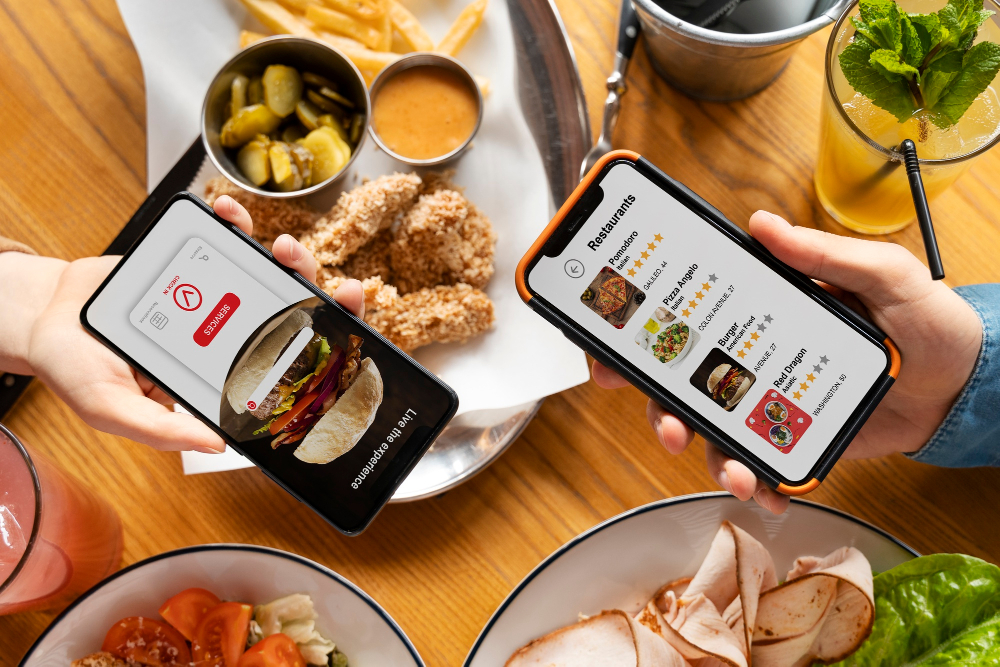In the modern digital age, customers have become accustomed to instant access, personalized services, and seamless experiences. Whether they’re making a reservation, browsing the menu, or paying the bill, convenience is paramount. For restaurants, this is where having a dedicated mobile app can make a huge difference. Not only does it enhance the customer experience, but it also streamlines operations and provides invaluable insights into business performance.
Here’s why every restaurant should seriously consider implementing a mobile app:
1. Enhanced Customer Convenience
Customers today demand convenience, and mobile apps provide just that. By having an app, restaurants can offer a more seamless and enjoyable dining experience for their guests.
-
Easy Reservations: With an app, customers can quickly check availability and make reservations, all without needing to call or go through a third-party service. This simple process not only improves customer satisfaction but also reduces the chances of double-booking or missed reservations.
-
Online Ordering & Payment: Mobile apps make it easy for customers to browse the menu, customize orders, and pay directly from their phones. Whether it’s for dine-in, takeaway, or delivery, ordering is faster, reducing wait times and improving overall service efficiency.
-
Loyalty and Rewards: Many apps include loyalty programs where customers can accumulate points or receive discounts based on their ordering habits. This fosters repeat business and incentivizes customers to keep coming back.
2. Streamlined Operations and Increased Efficiency
Behind the scenes, a mobile app integrated with your restaurant’s internal systems can significantly improve operational efficiency.
-
POS System Integration: A well-designed mobile app integrates seamlessly with your POS (Point of Sale) system, ensuring orders are immediately entered into the kitchen without errors. This reduces the chances of mistakes and improves the speed of service.
-
Real-Time Inventory Tracking: Mobile apps can sync with your inventory management system, providing real-time updates on ingredient availability. This helps the kitchen staff avoid running out of stock and allows for better planning of ingredient orders.
-
Simplified Communication: The app can serve as a communication hub for staff. Whether it’s sharing order status updates or notifying waitstaff about specific customer requests, a centralized system helps avoid miscommunication and enhances team collaboration.
3. Contactless Service
Post-pandemic, hygiene and safety are top priorities for customers. A mobile app can provide a contactless experience, ensuring your guests feel safe and secure.
-
Contactless Ordering & Payment: Customers can place orders, request refills, and pay bills all through their phone. This minimizes physical interaction with staff, reducing the risk of germs and improving overall guest safety.
-
Digital Menus: Gone are the days of paper menus, which can be germ carriers. With a digital menu in the app, customers can browse through items, view detailed descriptions and photos, and even check for allergen information with just a few taps.
-
Self Check-In/Out: For dine-in customers, the app can allow for self-check-in or check-out, reducing wait times and maintaining a safe, contactless environment.
4. Marketing and Customer Engagement
A mobile app doesn’t just serve your operational needs; it also provides valuable marketing opportunities to engage and retain customers.
-
Push Notifications: Apps allow you to send push notifications to customers about special deals, seasonal menu items, or upcoming events. It’s an effective way to keep your brand top-of-mind and drive traffic, especially during slower periods.
-
Targeted Promotions: With customer data on preferences and purchase history, you can offer personalized promotions. Whether it’s a discount on their favorite dish or an exclusive birthday offer, personalized experiences go a long way in building customer loyalty.
-
Social Media Integration: Many mobile apps let users easily share their experiences on social media. This organic promotion can drive awareness and bring in new customers through word-of-mouth, especially if they tag your restaurant in posts.
5. Data Collection & Insights
The data gathered by your restaurant’s mobile app can provide valuable insights to fine-tune your operations and marketing strategies.
-
Customer Preferences: Understanding what dishes are most popular, what times customers prefer to dine, and even what their favorite drinks are helps you tailor your menu and promotions to meet their needs.
-
Sales Analytics: Mobile apps can track customer spending patterns, providing you with real-time reports on your sales performance. This allows you to identify high-performing items, adjust pricing strategies, and forecast demand more accurately.
-
Staff Efficiency: By tracking ordering times, wait times, and service ratings, you can assess the efficiency of your staff and make improvements where needed. This could include offering training in specific areas or adjusting staffing levels during peak hours.
6. Boosted Brand Loyalty & Repeat Business
Customer retention is key to any restaurant’s success. A mobile app helps build brand loyalty and encourages customers to return.
-
Loyalty Programs: A built-in loyalty program is one of the best ways to encourage repeat visits. Offering rewards, discounts, or exclusive access to events through the app incentivizes customers to use the app regularly, building a community around your restaurant.
-
Custom Notifications: With targeted offers or birthday/anniversary greetings, customers are more likely to feel valued and return to your restaurant when they’re treated like VIPs.
7. A Competitive Advantage
In today’s competitive restaurant industry, standing out is essential. A mobile app can set your restaurant apart and help you stay ahead of the competition.
-
Tech-Savvy Perception: Restaurants that offer a seamless digital experience position themselves as modern and customer-oriented, attracting tech-savvy diners who appreciate the convenience of mobile services.
-
Attracting New Customers: An app can help expand your customer base by offering new and innovative ways for guests to interact with your restaurant. Whether it’s through social media sharing or exclusive app-only promotions, a well-designed app can drive new traffic to your restaurant.
8. Cost Savings & ROI
While developing a mobile app does come with an initial investment, the return on investment (ROI) can be significant.
-
Reduced Labor Costs: Automating tasks such as orders, payments, and reservations reduces the need for additional front-of-house staff, leading to lower labor costs.
-
Increased Revenue: A streamlined ordering process, personalized offers, and better marketing lead to higher sales. With features like upselling, cross-selling, and order customization, your app can increase customer spending per visit.
-
Operational Efficiency: With real-time tracking of orders, inventory, and customer feedback, your restaurant can reduce waste, optimize resource allocation, and improve overall productivity.
Conclusion
For restaurants, the future is mobile. A dedicated app offers not only convenience and enhanced customer experience but also serves as a powerful tool for improving operational efficiency, marketing efforts, and customer retention. As customers increasingly expect seamless, personalized experiences, a mobile app is no longer a luxury—it’s a must-have for staying competitive in the evolving restaurant industry. From boosting revenue and enhancing service to offering contactless experiences and collecting valuable data, the benefits of a restaurant mobile app are undeniable.
Investing in a mobile app is an investment in the future of your restaurant. The sooner you embrace this technology, the sooner you’ll see the rewards.

